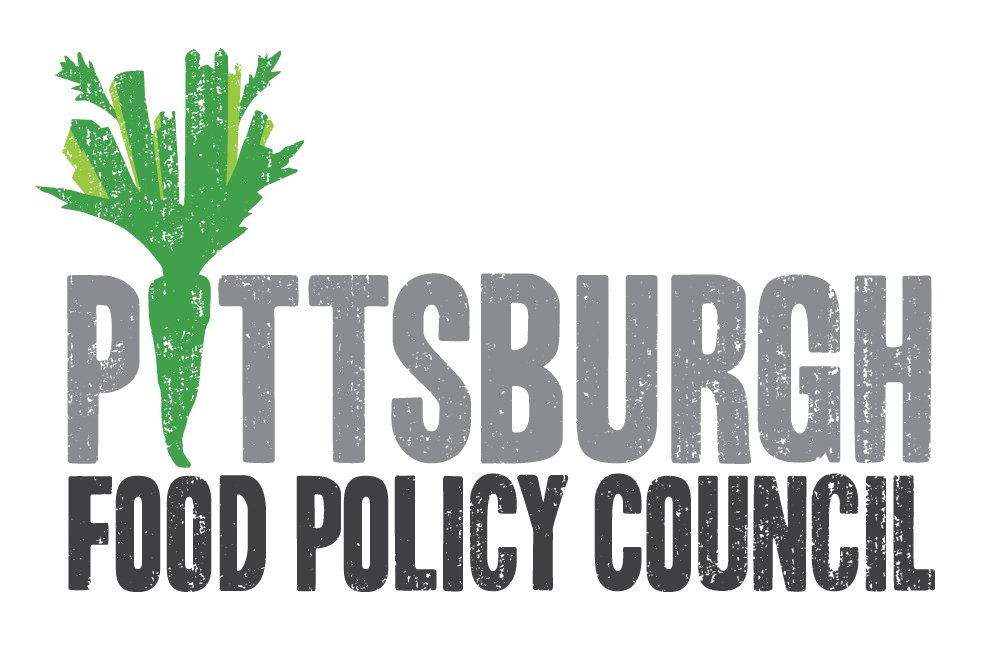Good Food Purchasing Program (GFPP)
Good Food Purchasing Program (GFPP)
Public institutions, such as schools, city and county departments, jails, and even hospitals or universities, spend millions of dollars each year to feed the people they serve. The Good Food Purchasing Program (GFPP) harnesses this purchasing power to drive positive change. Created by the Center for Good Food Purchasing, the policy helps institutions prioritize healthy, sustainable, regional, and fair foods in their purchasing contracts. By setting clear standards for how food is grown, processed, and distributed, GFPP enables communities to align food budgets with their core values, supporting local farmers, fair labor, environmental sustainability, and animal welfare.
The Pittsburgh Food Policy Council is partnering with Pittsburgh Public Schools, Allegheny County, and a strong coalition of local advocates, including Humane Action Pittsburgh, Sustainable Pittsburgh, UPMC Children’s Hospital, and Pasa Sustainable Agriculture, to create, promote, and help implement a Good Food Purchasing Policy within the district and across the region. Together, we advance Good Food policies and provide transparent reporting on institutional food purchases, ensuring that every dollar spent helps build a more just and resilient food system.
The five fundamental values of the GFPP are outlined below. Agencies and institutions commit to including language that promotes these values in their food contracts by adopting a purchasing policy.
Nutrition: Promote health and well-being by offering generous portions of vegetables, fruit, whole grains, and minimally processed foods, while reducing salt, added sugars, saturated fats, and red meat consumption and eliminating artificial additives. Improving equity, affordability, accessibility, and consumption of high-quality, culturally relevant Good Food in all communities is central to advancing Good Food purchasing practices.
Environmental sustainability: Sourced from producers that employ sustainable production systems to reduce or eliminate synthetic pesticides and fertilizers; avoid the use of hormones, routine antibiotics, and genetic engineering; conserve and regenerate soil and water; protect and enhance wildlife habitats and biodiversity; and reduce on-farm energy and water consumption, food waste and greenhouse gas emissions. Reduce menu items that have high carbon and water footprints, using strategies such as plant-forward menus that feature smaller portions of animal proteins in a supporting role. Examples of certifications and claims include USDA Organic, Animal Welfare Approved, Antibiotic Resistance Action Center Certified Responsible, Demeter Certified Biodynamic, American Grassfed, Seafood Watch, the Marine Stewardship Council, Food Alliance Certified, and Protected Harvest Certified Sustainable.
Regional economies: Support diverse, family and cooperatively owned, small and mid-sized agricultural and food processing operations within the local area or region.
Valued workforce: Sourced from producers and vendors that provide safe and healthy working conditions and fair compensation for all food chain workers and producers from production to consumption. Examples of certifications and claims include Food Justice Certified, the Equitable Food Initiative, Fair For Life, the US Federation of Worker Cooperatives, and the United Farm Workers.
Animal welfare: Sourced from producers that provide healthy and humane conditions for farm animals. Examples of certifications and claims include USDA Organic, American Grassfed, Certified Humane, Animal Welfare Approved, the Global Animal Partnership, American Humane Certified, 100% Grass-Fed, and Certified Grassfed by A Greener World.
PPS met 2 out of 5 value categories and achieved all Equity, Accountability, and Transparency (EAT) requirements on the very first round!
PROJECTS:
Support the implementation of the PPS Good Food Purchasing Policy by creating opportunities for accountability and transparency around food spend with the larger PPS community (parents, students, public).
Provide funding to public entities to participate in food purchasing assessments.
Engage and educate decision makers and publicly-funded agencies in support of a Good Food Purchasing Policy for Allegheny County
Lead the Pgh Good Food Coalition towards Good Food Purchasing goals at both the city and county levels.
Share information and engage with larger private institutions focused on any of the ‘good food’ values and their food purchases.
Relevant GPFAP Strategies
Recommendation 3.10 - Leverage the power of institutional procurement to strengthen our regional food system.
STRATEGY 3.10.1: Work with universities and hospitals in our region to adopt procurement policies that support the regional food economy

